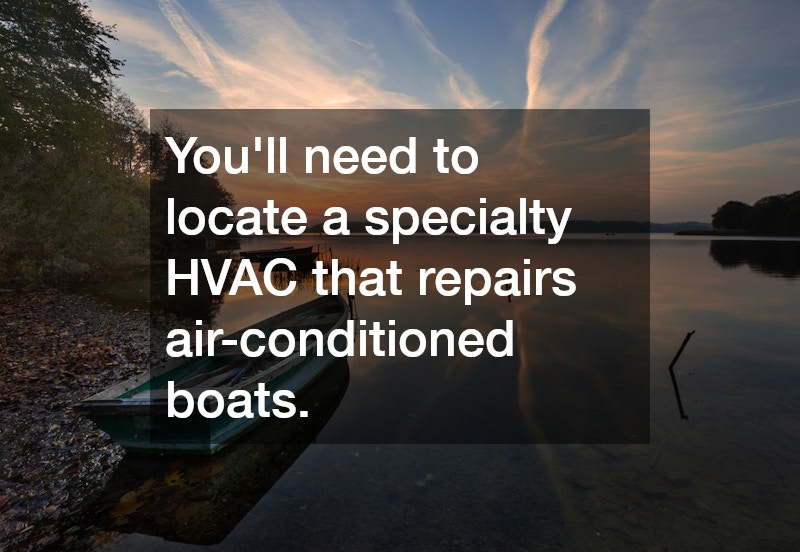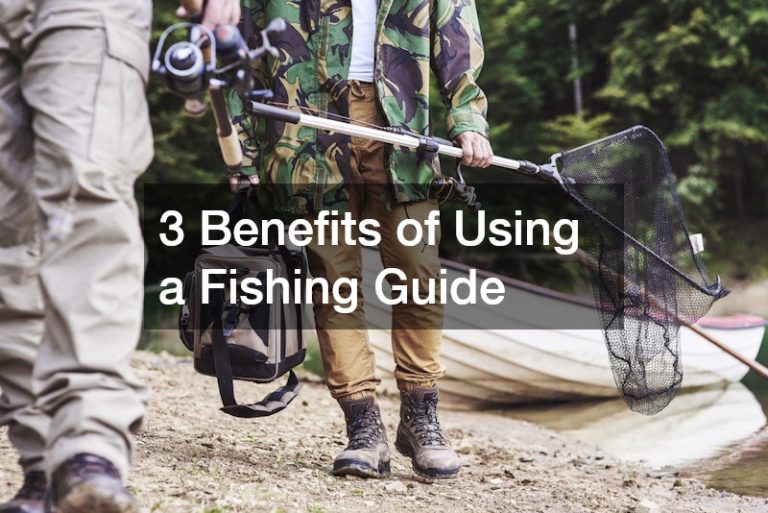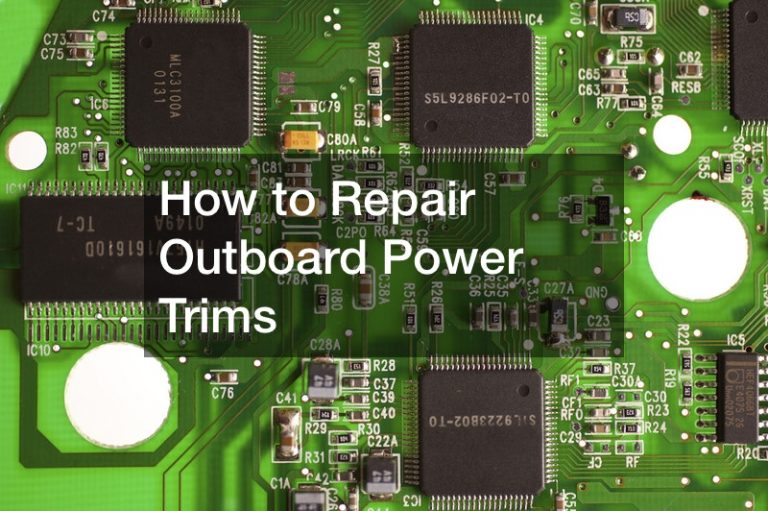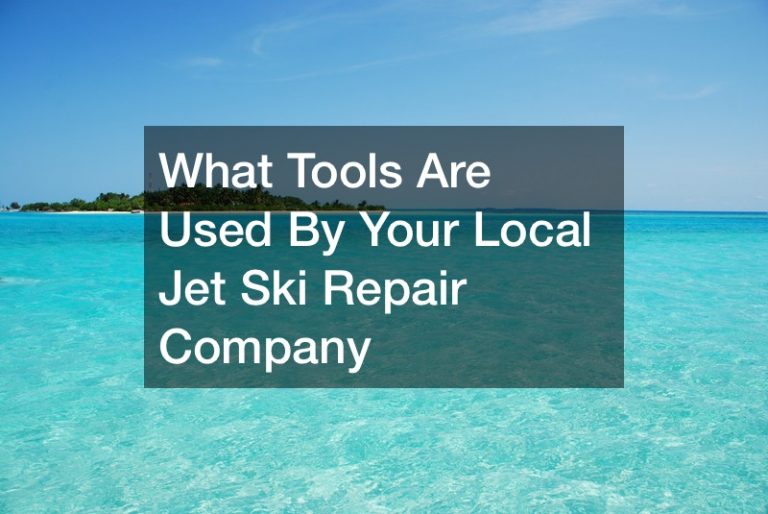
Canoes and kayaks lack boat A/C systems, but if you purchased a houseboat, fishing vessel, or yacht, you’ll eventually need marine AC repair and service. Skip phoning the heating, ventilation, and air conditioning (HVAC) service that you book for your home because the A/C on boats and ships differs. You’ll need to locate a specialty HVAC that repairs air-conditioned boats.

Marine air systems parts differ from those used in houses, meaning that even your marine air thermostat differs from one used on dry land. To find an expert in marine HVAC, ask the captains who moor their skiffs at your local marina. The marina manager probably knows a few talented HVAC professionals, too.
The Surprises of Owning a Boat
Many people express surprise at the many tasks related to caring for their new boat. The maintenance tasks do include items like barnacle removal from the ship’s hull. You might not have thought of a marine HVAC technician as someone you’d need to call, but your boat needs annual HVAC maintenance just like your home does. The ducts need cleaning each year, and the system should undergo inspection and essential maintenance like topping up the system fluids.

Boating, in all its glory, is a surprisingly active sport. Even zipping around in an automatic boat takes a considerable amount of skill when it comes to docking, cleaning, and more. If you’re just starting to get into boating, taking care of your boat and your body is key to excel in the sport.
This is especially true if you invest in other types of boating, like sailing, or perform activities while operating a boat, like water skiing. When you get into boating, there’s no end to the number of aquatic activities in which you can take part.
Consider this your guide to both boat and bodily maintenance when you choose to get into boating for the first time.
Being a responsible boat owner
When you get into boating for the first time, there are many aspects of boat ownership that you may not know about. You might even need to utilize a hard money loan to pay for the boat outright. While these loans are typically meant for flipping houses, they can be a great opportunity to make hefty down payments if you know you can pay back the loan quickly. But there are other aspects of boat ownership that you should consider.
For example, each boat owner should invest in boating insurance. This might seem unnecessary for some; after all, what’s going to happen when you’re out on the water. Since you have total control, the likelihood of getting into an accident is slim, right?
Unfortunately, this couldn’t be further from the truth boating insurance is essential to owning a boat. Not only does boating insurance protect your finances in the event of an accident with another boat, but it also protects it from accidental collisions with rocks, reefs, and more. Wreck removal coverage will help you remove your busted boat from the water while environmental pollution issues will be covered by your insurance. Since boats often run on gasoline, a single collision could result in environmental damage. Typically, your home insurance policy can include a segment for basic boating insurance. As long as you operate a smaller boat with a small engine, you should have no problem adding your boat to your home insurance policy.

Here are some of the top factors that affect your insurance rates when you get into boating:
- The age of the boat
- The length and type of boat you’re operating
- The horsepower of the boat’s engine
- The boat’s current condition and whether it meets the updated guidelines to operate on the water
- The number of owners it has had
- Where the boat will be operated (lake, ocean, river, etc.)
Boating insurance is also key if you want to let other people drive your boat, like a family member. Along with insurance, however, you need to take the necessary safety precautions when you’re out on the water. This includes installing a radio to contact the shore, supplying any life vests for each member of your crew, and utilizing flare guns as needed. Of course, in some states, a boating license is also necessary to operate a boat so keep this in mind when you make your final purchase. Talk to personal injury lawyers to see if they have any advice when it comes to operating a boat and the common issues boat owners have in regard to legal issues.
Cleaning your boat
One of the most important things you can do as a boat owner is cleaning your boat. This includes utilizing the regular recycling tips that come with daily life but it means more than sweeping up the crumbs from your last fishing trip; it means really getting down and dirty to scrub and shine your boat’s exterior.
Cleaning your boat is important for a number of reasons. Not only will regular boat cleaning prevent its exterior from rusting, but it’s also key in improving the overall longevity of your boat. The last thing you want to happen is springing a leak when you’re out on the water. The water damage to the inside of your boat can ruin your vehicle and force you to retire it sooner than later.
Cleaning your boat is also key in protecting the environment. If you bring your boat into multiple different bodies of water, you could be introducing invasive species to new areas. Bacteria, mollusks, aquatic plants, and even some fish can be transported to new areas if you aren’t cleaning them properly. That’s how the invasive sea lamprey issue became so disastrous in Lake Ontario. Cleaning your boat will ensure that you’re not causing environmental harm.
Cleaning your boat is easy so long as you invest in the right storage. Dry indoor boat storage is, perhaps, one of the most difficult options, but it’s also one of the best ways to ensure your boat’s longevity.

Indoor boat storage is one of the most expensive options, but it ensures that your boat is not exposed to the elements. You can always store your boat in your garage behind a quality garage door installation, but many people choose to invest in a “boatel.” This type of dry rack facility is operated by professionals. Your boat will be stored on giant racks among countless other boats under the protective shelter of a large building. This is essential if you want to protect your boat in the off-season where rain, hail, and snow could impact your boat’s longevity.
You can also opt for outdoor dry boat storage, but it’s recommended that you utilize a covering to protect it from the elements.
During the on-season or if you live in an area with stable weather, wet storage might be the best option for you. This type of storage involves keeping your boat in a dock or harbor. If you plan on boating multiple times a week, this is the perfect option for you during boating season. Just be sure to give it a good scrub down every once in a while out of the water to ensure its health for the long term.
Mechanical boat maintenance
Maintaining your boat is one of the most important parts of being a boat owner. Many people neglect this aspect of owning a boat when they first get into boating because they’re just so excited to get on the water. But maintaining your boat is key unless you want to get stranded in the middle of the lake.
Here are some of the most important components in maintaining your boat.
- The engine is one of the most important parts of your boat (unless you’re operating a sailboat). Without the necessary engine maintenance, the humidity, saltwater, and wear and tear can cause engine failure when you least expect it. Invest in the necessary engine checks regularly to monitor its health. In fact, you have to flush the motor of debris every trip.
- Take care of the propeller by keeping it clear of debris and cleaning it often. Excess oil build-up is a common problem that many people don’t think about.
- How are the electrical systems? Don’t forget that your radio needs maintenance too, along with any lights.
- In large boats, you should also monitor your plumbing and HVAC systems for the comfort of your sailors. Clean these components regularly and get them serviced as needed.

Maintaining your boat will cost a lot of time and a lot of money. However, investing in your boat’s health is better than paying hospital bills from a preventable accident later. When you get into boating, realize that it’s a big responsibility that shouldn’t be taken lightly.
Taking care of your skin
When you get into boating, you’ll want to get onto the water as soon as possible. Unfortunately, you’re lacking the necessary precautions needed to have a successful sailing trip. Before you get onto the water, you’ll need to take care of your skin. After all, the water does a great job at reflecting the sun’s rays back at you. You’re more likely to get a sunburn when you’re out sailing and repeated sunburns can contribute to the development of skin cancer. In some cases, a burn might be bad enough to go to the hospital or your local urgent care clinic.
Here are some of the best ways to maintain your skin out on the water:
- Wear sunscreen with a high SPF to protect your skin from the sun’s UV rays.
- Wear a floppy hat to protect your face, ears, and necks from the worst damage.
- Wear loose cotton clothing that’s breathable. Even a single layer of cotton clothing can mitigate the worst of the sun’s damage.
- Invest in a boat awning that you can pull out to protect your guests when idle.
Any time you’re outdoors, it’s imperative that you take good care of your skin.
Taking care of your body
Studies have shown that boating can be great for your health. Not only are you regularly cleaning and maintaining your boat, but the act of getting on the water is great for your mental health, too. Spending any time outdoors will help foster mental fortitude since it helps ground you in the moment. When you’re engaging in a low impact sport like boating, these benefits are only amplified.
Along with protecting your skin, protecting your entire body, including your muscles and bones, is key. Boating is a very active sport, especially if you’re investing in sailing or any watersports. Even if you’re simply going on a nice outing on the water, remembering to wear your sneakers for foot problems can prevent your health from deteriorating.
When you start to get into boating, it’s only natural that you might push yourself too hard. After all, it’s an exciting time! You want to swim, you want to fish, and you want to indulge in every opportunity your boat has to offer. But just like with any other sport, boating can come with some serious side effects.
It’s not uncommon for some serious boaters to develop back issues from pushing their body too hard. In this case, you’ll want to consult with a chiropractor or spine surgeon to discuss your options. You might not need spine surgery for a ruptured disc — just plenty of relaxation — but other issues can develop from there.

It’s important that you stretch before engaging in any physical activity but it’s also key to know your limits. If you’re not prepared, you might have to engage in physical therapy. Talking to sports medicine physicians might be in your best interest, especially if you have chronic health issues that might impact your ability to boat safely.
Don’t feel like you need to leave your knee high support hose at home just because you might get them wet. Taking care of your health is one of the most important things you can do, especially when you go boating.
Get into boating with these tips
When you get into boating, you’re excited by the countless opportunities. Following these tips, however, will help you become a more responsible, healthy boat owner. Rely on this advice to make the most of your time owning a boat.





